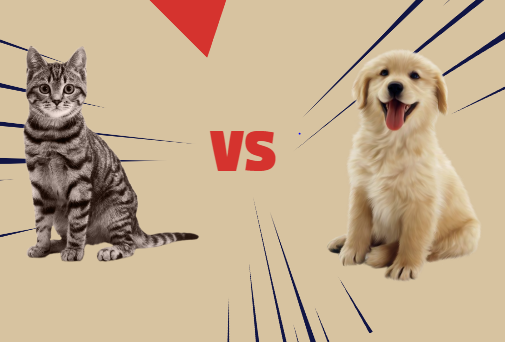Cats vs. Dogs: Exploring the Endless Debate of Pet Preference

The debate of cats vs. dogs has been ongoing for centuries, sparking countless discussions and rivalries among pet lovers. These two beloved animals offer distinct companionship experiences, each with its unique characteristics, personalities, and charm. In this article, we will delve into the age-old debate, comparing cats and dogs across various aspects to help you make an informed decision when choosing a pet according to Farry Pet.
1. Companionship and Affection
Cats: Cats are known for their independent nature. They can be affectionate but often on their terms. They may curl up on your lap one moment and then disappear to their favorite hiding spot the next. This unpredictable behavior can be endearing to some, providing a sense of achievement when a cat chooses to show affection.
Dogs: Dogs are famously loyal and affectionate, often showering their owners with unconditional love. They thrive on attention, forming strong bonds and craving human interaction. They are more likely to greet you enthusiastically when you return home, making you feel truly cherished.
2. Exercise and Activity Levels
Cats: Cats are relatively low-maintenance when it comes to exercise. They are independent playmates and can entertain themselves with toys or a good old cardboard box. However, some cat breeds are more active and require more playtime and stimulation than others.
Dogs: Dogs are active animals that need regular exercise to stay healthy and happy. Depending on the breed, they may require daily walks, runs, or play sessions. For active individuals or families, a dog can be an excellent motivator to stay active and explore the outdoors.
3. Training and Obedience
Cats: Cats are notoriously independent, which can make them less trainable compared to dogs. While it is possible to train a cat to perform tricks or use a litter box, their response to training largely depends on their individual personality and motivation.
Dogs: Dogs are generally more trainable and obedient. They respond well to commands, and with consistent training, they can learn a wide range of tricks and behaviors. This obedience can make dogs easier to integrate into a structured household routine.
4. Grooming and Maintenance
Cats: Cats are meticulous groomers and usually keep themselves clean. However, some long-haired breeds may require regular brushing to prevent matting and hairballs. Cat owners will also need to provide a litter box and clean it regularly.
Dogs: Dogs come in various coat types, each with its grooming needs. Long-haired breeds often require frequent brushing and occasional grooming, while short-haired breeds may need less maintenance. Dogs also require regular outdoor bathroom breaks, making them reliant on their owners for walks.
5. Space and Housing
Cats: Cats are highly adaptable to different living spaces. They are well-suited for apartment living as long as they have a comfortable spot to perch and access to a litter box. They often enjoy the freedom of both indoor and outdoor environments if it’s safe for them.
Dogs: The space and housing requirements for dogs depend on their breed and size. Larger breeds may need more room to roam, making them better suited for houses with yards. Smaller breeds can thrive in apartments but still require outdoor exercise.
6. Allergies and Health Considerations
Cats: Cat allergies are relatively common and can cause respiratory issues, sneezing, and itching in sensitive individuals. Regular grooming and cleaning can help reduce allergens.
Dogs: While some people are allergic to dogs, allergies tend to be less common than cat allergies. However, specific breeds may produce fewer allergens, making them a better choice for allergy sufferers.
7. Lifespan and Commitment
Cats: Cats generally have a longer lifespan compared to dogs, with many living well into their late teens or early twenties. This means a longer commitment for cat owners, who need to be prepared for the responsibilities of pet ownership over an extended period.
Dogs: Dogs typically have a shorter lifespan, often ranging from 8 to 15 years, depending on the breed. While this means a shorter commitment in terms of years, it also means facing the inevitable loss of a beloved pet sooner.
Conclusion
The choice between cats and dogs ultimately comes down to personal preference, lifestyle, and individual circumstances. Cats offer independence and low-maintenance companionship, while dogs provide loyalty, companionship, and an active lifestyle. Before deciding, consider your living situation, activity level, allergies, and the amount of time and effort you can invest in pet care. Both cats and dogs can bring immense joy and love into our lives, making them cherished members of the family, regardless of the ongoing debate.



